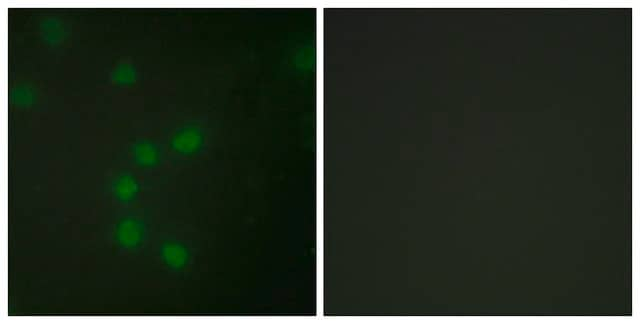S7701-M
TRAPeze™Telomerase Positive Control Cell Pellet
This product is intended for use with the components of the TRAPEZE Telomerase Detection Kit, the TRAPEZE XL Telomerase Detection Kit & the TRAPEZE ELISA Telomerase Detection Kit.
Sign Into View Organizational & Contract Pricing
All Photos(1)
About This Item
UNSPSC Code:
41116012
eCl@ss:
32160405
NACRES:
NA.84
Recommended Products
Quality Level
manufacturer/tradename
Chemicon®
General description
This product is intended for use with the components of the TRAPEZE™ Telomerase Detection Kit (Catalog # S7700), the TRAPEZE XL Telomerase Detection Kit (Catalog # S7707) and the TRAPEZE ELISA Telomerase Detection Kit (Catalog # S7750). Recommended Taq polymerases: must be non-proofreading, having no exonuclease activity and capable of "hot-start." Titanium Taq, Platinum Taq are suggested.
Material Provided
Each vial of S7701 TRAPEZE Positive Control Cell Pellet contains one million cells, pelletted to the bottom of the microcentrifuge tube.
Material Provided
Each vial of S7701 TRAPEZE Positive Control Cell Pellet contains one million cells, pelletted to the bottom of the microcentrifuge tube.
Application
Instructions for Use
1. Resuspend the cell pellet in 200 μl of 1X CHAPS Lysis Buffer.
2. Incubate the suspension on ice for 30 minutes.
3. Spin the sample in a microcentrifuge at 12,000 X g for 20 minutes at 4°C.
4. Transfer 160 μl of the supernatant into a fresh tube.
5. Aliquot and quick-freeze the remaining extract on dry ice, and store at -75°C to -85°C. The extracts for the TRAP assay should be quick-frozen on dry ice after each use. Aliquots should not be freeze-thawed more than 5 times to avoid loss of telomerase activity. Additionally, aliquoting reduces the risk of contamination.
6. Use 1000 cell equivalents (2 μl of a 1:10 dilution) per TRAP assay, according to the kit manuals.
1. Resuspend the cell pellet in 200 μl of 1X CHAPS Lysis Buffer.
2. Incubate the suspension on ice for 30 minutes.
3. Spin the sample in a microcentrifuge at 12,000 X g for 20 minutes at 4°C.
4. Transfer 160 μl of the supernatant into a fresh tube.
5. Aliquot and quick-freeze the remaining extract on dry ice, and store at -75°C to -85°C. The extracts for the TRAP assay should be quick-frozen on dry ice after each use. Aliquots should not be freeze-thawed more than 5 times to avoid loss of telomerase activity. Additionally, aliquoting reduces the risk of contamination.
6. Use 1000 cell equivalents (2 μl of a 1:10 dilution) per TRAP assay, according to the kit manuals.
Research Category
All
All
This product is intended for use with the components of the TRAPEZE Telomerase Detection Kit, the TRAPEZE XL Telomerase Detection Kit & the TRAPEZE ELISA Telomerase Detection Kit.
Packaging
1x10(e6) cells
Storage and Stability
Must be stored at -75°C to -85°C. Telomerase in specimens stored as a cell pellet is stable at this temperature for several years. Once the cell extract is made (in 1X CHAPS Lysis Buffer), it is stable for 1 year, if not subjected to more than 5 freeze-thaw cycles
Legal Information
CHEMICON is a registered trademark of Merck KGaA, Darmstadt, Germany
TRAPEZE is a trademark of Merck KGaA, Darmstadt, Germany
Disclaimer
Unless otherwise stated in our catalog or other company documentation accompanying the product(s), our products are intended for research use only and are not to be used for any other purpose, which includes but is not limited to, unauthorized commercial uses, in vitro diagnostic uses, ex vivo or in vivo therapeutic uses or any type of consumption or application to humans or animals.
Storage Class Code
12 - Non Combustible Liquids
WGK
WGK 2
Flash Point(F)
Not applicable
Flash Point(C)
Not applicable
Certificates of Analysis (COA)
Search for Certificates of Analysis (COA) by entering the products Lot/Batch Number. Lot and Batch Numbers can be found on a product’s label following the words ‘Lot’ or ‘Batch’.
Already Own This Product?
Find documentation for the products that you have recently purchased in the Document Library.
A M Zahler et al.
Nature, 350(6320), 718-720 (1991-04-25)
The ends or telomeres of the linear chromosomes of eukaryotes are composed of tandem repeats of short DNA sequences, one strand being rich in guanine (G strand) and the complementary strand in cytosine. Telomere synthesis involves the addition of telomeric
Our team of scientists has experience in all areas of research including Life Science, Material Science, Chemical Synthesis, Chromatography, Analytical and many others.
Contact Technical Service







